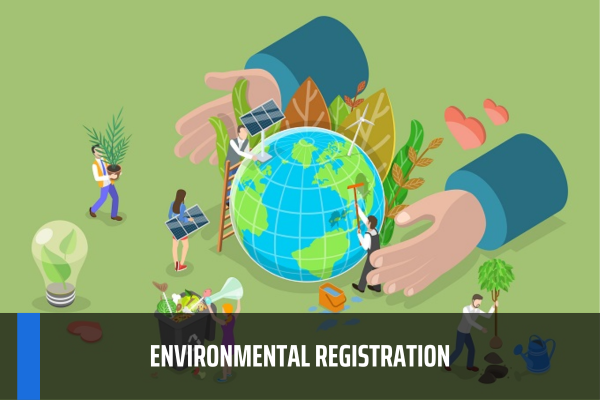According to the Law on Environmental Protection 2020, what is environmental registration in Vietnam? Who are obliged registrants?
According to the Law on Environmental Protection 2020, what is environmental registration in Vietnam?
Pursuant to the provisions of Clause 9, Article 3 of the Law on Environmental Protection 2020, the concept of environmental registration is clearly stated as follows:
“environmental registration” means a business investment project owner or business owner registering with a regulatory body waste discharge-related contents and environmental protection measures of such business investment project owner or business owner (hereinafter referred to as “the investment project/business”).

According to the Law on Environmental Protection 2020, what is environmental registration in Vietnam? Who are obliged registrants? (Image from the Internet)
Vietnam: Who are obliged registrants?
Pursuant to the provisions of Article 49 of the Law on Environmental Protection 2020, it is clearly stated as follows:
Environmental registration
1. Obliged registrants:
a) Waste-generating investment projects not required to obtain an environmental license;
b) Waste-generating businesses operating before the effective date of this Law not required to obtain an environmental license.
2. The registrants specified in Clause 1 of this Article shall be exempt from environmental registration, including:
a) Investment projects and businesses classified as state secrets in the field of national defense and security;
b) Investment projects when put into operation and businesses that do not generate waste or only generate a small quantity of waste which is treated using in situ waste treatment works or managed in accordance with regulations of the local government;
c) Other registrants.
3. Communal People’s Committees shall receive environmental registration forms of the registrants specified in Clause 1 of this Article in person, by post or through the online public service system.
For an investment project or business that involves at least 02 communes, the investment project/business owner is entitled to select the People’s Committee of any commune to carry out environmental registration.
4. Environmental registration shall cover:
a) General information about the investment project/business;
b) Type of production, business and service; technologies, capacity, products; raw materials, fuels and chemicals used (if any);
c) Type and quantity of waste generated;
d) A scheme to collect, manage and treat waste as prescribed;
dd) Commitments to environmental protection.
5. During the operation, if the investment project or business changes any registered content, the investment project/business owner shall carry out environmental registration again before making a change.
If the scale or nature of the investment project or business that is subject to EIA or required to obtain an environmental license, the investment project/business owner shall comply with regulations on EIA and environmental licenses in accordance with this Law.
6. The time for environmental registration is as follows:
a) The investment projects that are specified in Point a Clause 1 of this Article and subject to EIA and environmental registration before being put into official operation;
b) The investment projects that are specified in Point a Clause 1 of this Article but not subject to EIA and environmental registration before the competent authority issue the construction permit if a construction permit is required in accordance with regulations of law on construction or before waste is discharged into the environment if a construction permit is not required in accordance with regulations of law on construction;
c) The businesses that are specified in Point b Clause 1 of this Article and subject to environmental registration within 24 months from the effective date of this Law.
....
According to the above regulations, obliged registrants:
- Waste-generating investment projects not required to obtain an environmental license;
- Waste-generating businesses operating before the effective date of this Law not required to obtain an environmental license.
The registrants shall be exempt from environmental registration, including:
- Investment projects and businesses classified as state secrets in the field of national defense and security;
- Investment projects when put into operation and businesses that do not generate waste or only generate a small quantity of waste which is treated using in situ waste treatment works or managed in accordance with regulations of the local government;
- Other registrants.
What are the principles of environmental protection in Vietnam?
Pursuant to the provisions of Article 4 of the Law on Environmental Protection 2020, it is stipulated as follows:
Principles of environmental protection
1. Environmental protection is the right, obligation and responsibility of every agency, organization, residential community, household and individual.
2. Environmental protection serves as a basis, key factor and prerequisite for sustainable socio-economic development. Environmental protection activities are associated with economic development and natural resource management, and considered and assessed in the process of carrying out development activities.
3. Environmental protection harmonizes with social security, protection of children’s right, promotion of gender equality and protection of the human right to live in a pure environment.
4. Environmental protection activities are carried out in a regular, public and transparent manner; priority is given to prediction and prevention of environmental pollution, emergencies and degradation, environmental risk management, waste minimization and strengthening of reuse and recycling of waste with a view to maximization of its value.
5. Environmental protection complies with natural law, natural, cultural and historical characteristics, and the level of socio-economic development; boost development in ethnic minority and mountainous areas.
6. Any agency, organization, residential community, household or individual profiting from the environment is obliged to make their financial contribution to the environmental protection activities; pay compensation for damage, take remedial measures and assume other responsibilities as prescribed by law if causing environmental pollution, emergencies and degradation.
7. Environmental protection is not detrimental to the national sovereignty, security and interests, and is associated with regional and global environmental protection.
Accordingly, environmental protection includes the principles prescribed above.
Thư Viện Pháp Luật